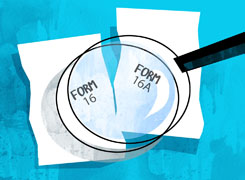Ramalingam Kalirajan |10891 Answers |Ask -Follow
Mutual Funds, Financial Planning Expert - Answered on Jul 12, 2024
He has an MBA in finance from the University of Madras and is a certified financial planner.
He is the director and chief financial planner at Holistic Investment, a Chennai-based firm that offers financial planning and wealth management advice.... more

Hi Sir I have 18 years old son started to college , I would like to transfer 10-15 lacs from my corpus to his to start MF and FD investment for longer run. what sort of precautionary measure to take to avoid any tax complications later. Thank you Kumar
Investing in your son’s future is a wise and caring move. To ensure smooth and efficient management, here are comprehensive steps and precautions for transferring funds into mutual funds and fixed deposits, along with ways to avoid tax complications later on.
Understanding the Investment Landscape
Investing in mutual funds and fixed deposits (FDs) can be highly beneficial. Each has its own advantages, risks, and growth potential. Let’s delve into both to understand them better.
Mutual Funds
Advantages:
Diversification: Mutual funds invest in a wide range of securities, reducing risk.
Professional Management: Fund managers use their expertise to manage your investments.
Liquidity: Easy to buy and sell mutual fund units as needed.
Power of Compounding: Long-term investments can significantly grow due to compounding.
Categories:
Equity Funds: Higher risk and higher returns, ideal for long-term goals.
Debt Funds: Lower risk, stable returns, good for short to medium-term goals.
Hybrid Funds: Mix of equity and debt, balancing risk and reward.
Risks:
Market Risk: The value of investments can fluctuate based on market conditions.
Interest Rate Risk: Changes in interest rates can affect debt funds' performance.
Inflation Risk: Returns may not always keep pace with inflation, affecting purchasing power.
Fixed Deposits (FDs)
Advantages:
Safety: FDs are considered safe with assured returns.
Fixed Returns: Interest rates are locked in, providing predictable income.
Tax Benefits: Some FDs offer tax benefits under Section 80C of the Income Tax Act.
Risks:
Lower Returns: FDs generally offer lower returns compared to mutual funds.
Liquidity: Early withdrawal can result in penalties.
Steps for Investing in Your Son's Name
1. Open a Bank Account
First, ensure your son has a bank account. This is essential for all subsequent investments and transactions. Ensure the account is in his name, with you as the guardian, if needed.
2. Open a Demat and Trading Account
For investing in mutual funds, a Demat and trading account in your son’s name is crucial. This facilitates easy purchase, holding, and selling of mutual fund units.
3. Know Your Customer (KYC) Compliance
Complete the KYC process for your son. KYC is mandatory for mutual fund investments. It involves submitting identity and address proofs, and your son needs to be compliant to invest.
4. Nomination
Ensure that a nomination is set up. It ensures smooth transfer of funds in case of unforeseen circumstances. You can be the nominee or appoint someone you trust.
Investment Strategy
Mutual Funds
Choosing the Right Funds:
Long-Term Goals: For long-term investments, equity mutual funds are ideal. They offer higher returns over time due to market growth and compounding.
Balanced Approach: Consider hybrid funds for a mix of equity and debt. They balance risk and provide steady growth.
Regular Funds vs. Direct Funds: Invest through a Certified Financial Planner (CFP). Regular funds managed by a CFP offer professional advice and management, ensuring better growth and risk management compared to direct funds.
Systematic Investment Plan (SIP):
SIP Benefits: Encourage your son to start a SIP. It promotes disciplined investing, averaging out market volatility, and leveraging the power of compounding.
Fixed Deposits
Laddering Strategy:
Laddering FDs: Divide the investment into multiple FDs with different maturities. This ensures liquidity and better management of interest rate risks.
Reinvestment: Upon maturity, reinvest the FD for continued growth. Align maturity dates with future financial needs.
Tax Considerations
Clubbing of Income
Avoid Clubbing:
Minor’s Income: Income earned by a minor is clubbed with the parent’s income. To avoid this, ensure the investments are in your son’s name post attaining majority.
Transfer Post-Majority: If your son is 18, transfer investments to his name directly. This prevents income clubbing, reducing your tax burden.
Gift Tax
Exemptions:
Gifts to Son: Any amount transferred to your son is exempt from gift tax. Utilize this exemption to transfer funds without any tax implications.
Capital Gains Tax
Long-Term and Short-Term Gains:
Equity Funds: Long-term capital gains (LTCG) above Rs 1 lakh in a financial year are taxed at 10%. Short-term gains are taxed at 15%.
Hybrid Debt Funds: LTCG on debt funds are taxed at 20% with indexation benefits. Short-term gains are added to your income and taxed as per the applicable slab.
Tax-Saving Strategies
Tax-Saving Funds:
ELSS: Consider investing in Equity Linked Savings Scheme (ELSS). It offers tax benefits under Section 80C and potential for good returns.
5-Year FDs: Invest in tax-saving FDs with a 5-year lock-in period. They offer tax benefits under Section 80C.
Monitoring and Review
Regular Monitoring
Track Performance: Regularly monitor the performance of your investments. Use online tools and apps to stay updated.
Annual Review: Conduct an annual review of the portfolio. Adjust allocations based on market conditions and financial goals.
Rebalancing
Maintain Balance: Rebalance the portfolio periodically to maintain the desired asset allocation. This ensures optimal growth and risk management.
Avoid Emotional Decisions: Stay focused on long-term goals. Avoid making investment decisions based on short-term market fluctuations.
Ensuring Smooth Transfer of Assets
Nomination and Will
Nomination:
Nomination: Ensure nominations are updated for all investments. This simplifies the transfer process in case of unforeseen events.
Will:
Draft a Will: Draft a will clearly stating the distribution of assets. This ensures that your son receives the intended investments without legal hassles.
Power of Attorney
Legal Authorization:
Power of Attorney: Consider granting a power of attorney to a trusted person. This ensures that your investments are managed smoothly in case of any incapacity.
Final Insights
Investing in your son's future through mutual funds and fixed deposits is a commendable decision. It provides financial security and helps build a substantial corpus over time. By understanding the advantages and risks associated with mutual funds and fixed deposits, you can make informed decisions.
Remember, mutual funds offer professional management, diversification, and the power of compounding, making them suitable for long-term growth. Fixed deposits, on the other hand, provide safety and fixed returns, ideal for conservative investors.
Ensure all investments are in your son’s name to avoid clubbing of income and utilize the gift tax exemptions effectively. Opt for tax-saving instruments like ELSS and 5-year FDs to optimize tax benefits.
Regularly monitor and review the portfolio, rebalancing it to maintain the desired asset allocation. Update nominations and draft a will to ensure a smooth transfer of assets.
By following these steps, you can secure your son’s financial future, allowing him to focus on his education and career without worrying about finances. You are setting a strong foundation for his future, and that is truly admirable.
Best Regards,
K. Ramalingam, MBA, CFP,
Chief Financial Planner,
www.holisticinvestment.in
You may like to see similar questions and answers below
Vivek Lala |323 Answers |Ask -Follow
Tax, MF Expert - Answered on Jun 01, 2024
Milind Vadjikar | Answer |Ask -Follow
Insurance, Stocks, MF, PF Expert - Answered on Sep 30, 2024
Vipul Bhavsar | Answer |Ask -Follow
Tax Expert - Answered on Apr 04, 2025
Vipul Bhavsar | Answer |Ask -Follow
Tax Expert - Answered on May 15, 2025
Ramalingam Kalirajan |10891 Answers |Ask -Follow
Mutual Funds, Financial Planning Expert - Answered on Dec 15, 2025
Ramalingam Kalirajan |10891 Answers |Ask -Follow
Mutual Funds, Financial Planning Expert - Answered on Dec 15, 2025
Ramalingam Kalirajan |10891 Answers |Ask -Follow
Mutual Funds, Financial Planning Expert - Answered on Dec 15, 2025
Samraat Jadhav |2508 Answers |Ask -Follow
Stock Market Expert - Answered on Dec 15, 2025
Ramalingam Kalirajan |10891 Answers |Ask -Follow
Mutual Funds, Financial Planning Expert - Answered on Dec 15, 2025
Reetika Sharma |425 Answers |Ask -Follow
Financial Planner, MF and Insurance Expert - Answered on Dec 15, 2025
Radheshyam Zanwar |6745 Answers |Ask -Follow
MHT-CET, IIT-JEE, NEET-UG Expert - Answered on Dec 15, 2025
Reetika Sharma |425 Answers |Ask -Follow
Financial Planner, MF and Insurance Expert - Answered on Dec 15, 2025
Ramalingam Kalirajan |10891 Answers |Ask -Follow
Mutual Funds, Financial Planning Expert - Answered on Dec 15, 2025
Ramalingam Kalirajan |10891 Answers |Ask -Follow
Mutual Funds, Financial Planning Expert - Answered on Dec 15, 2025



























.jpg)
